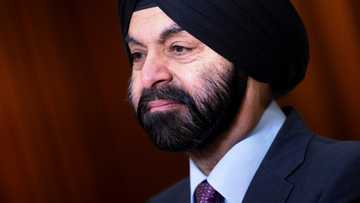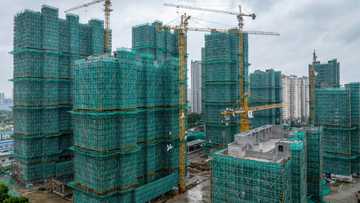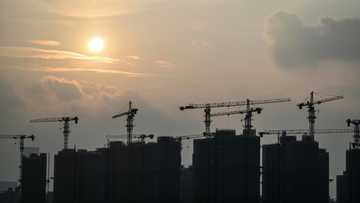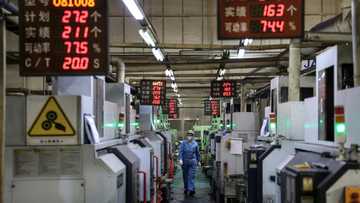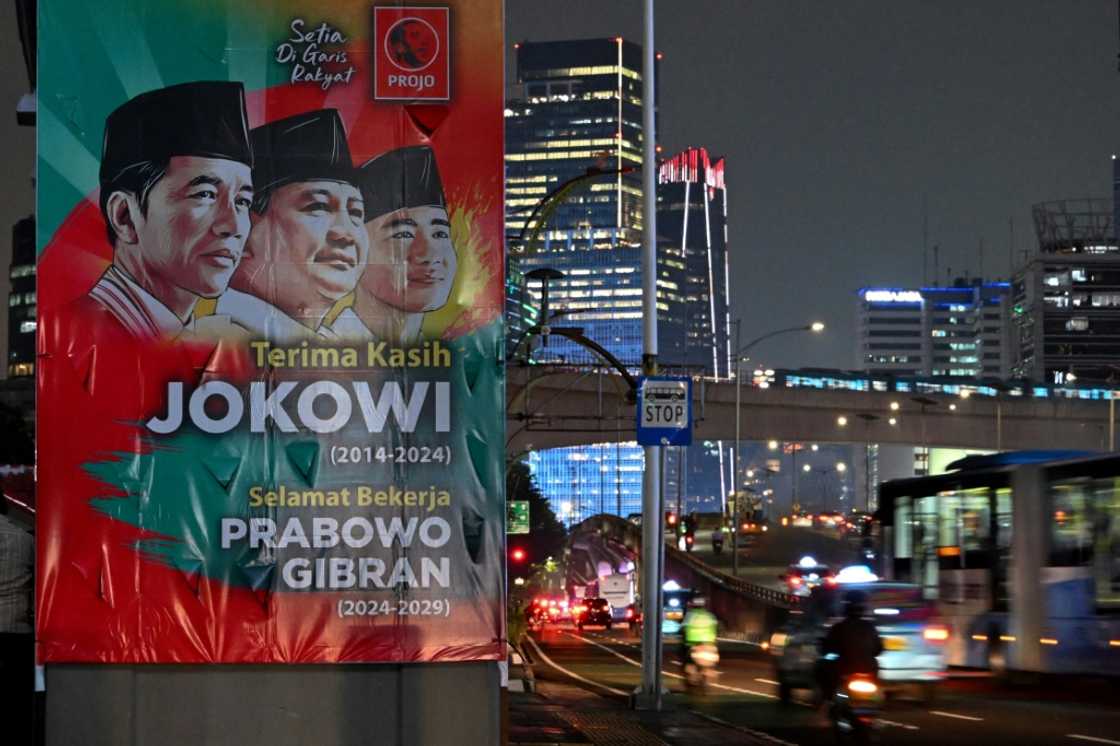
Photo: BAY ISMOYO / AFP
Source: AFP
Indonesian President Joko Widodo leaves office Sunday with high approval ratings thanks to strong economic growth, but his successor Prabowo Subianto has bigger ambitions, including an eye-catching $28 billion free meal plan for students.
While the country regularly enjoys about five percent annual expansion, the former general has pledged to capitalise on his predecessor’s policies to reach eight percent by tapping the nation’s huge human resources.
“From prosperity, we can bring justice to all Indonesian people. We must unite to eliminate poverty and eliminate hunger, and eliminate suffering from our people,” Prabowo said in his victory speech in March.
To do that, he is banking on big national projects, the archipelago’s vast natural resources and attempts to lower a poverty rate of more than nine percent.
He has pledged to largely carry on the popular economic programme of Widodo, better known as Jokowi, but he has also signalled a more direct attempt to alleviate poverty in the nation of around 280 million.
His big campaign pledge is a $28 billion plan to supply tens of millions of schoolchildren and pregnant women nationwide with free meals.
He says the scheme — to be rolled out in January — will halt stunted growth in a country where more than a fifth of children up to five years old are affected and create several million more jobs.
Yet the plan has faced criticism over logistical and cost issues, with some wondering how he can pull off the plan and keep spending within the annual fiscal deficit limit of three percent of GDP, which is mandated by law.
Jokowi focussed on large infrastructure projects including roads, bridges and airports aimed at better connecting the archipelago.
But experts say Prabowo will deviate from that in his bid to realise a campaign promise to turn Indonesia, a G20 member, into an “advanced and developed” economy.
“He won’t be blindly following Jokowi’s footsteps, but he also won’t completely abandon or neglect everything, so he will be somewhat in the middle,” said Yose Rizal Damuri, an economist at the Centre for Strategic and International Studies.
“It seems like he has a slightly different approach from Jokowi. The priority is no longer infrastructure development, but more to human capital development.”
His agenda will also focus on agriculture, observers say, with a food estate programme aimed at achieving food self-sufficiency, land clearing for bioethanol projects in the restive eastern region of Papua, and a green fund selling carbon emission credits.
Capital crunch
At the same time, Prabowo is inheriting Jokowi’s legacy project — a $32 billion move of the capital from traffic-clogged and sinking Jakarta to Nusantara, a planned green city in eastern Borneo where construction is under way.
The city will not be ready until 2045, but its rapid construction is already eating into state coffers.
Prabowo has pledged to continue the project despite speculation he would put it on hold or keep Jakarta as the capital.
He has also supported Jokowi’s resource nationalism, particularly in the nickel sector, where Jakarta has imposed export restrictions in a bid to become a key player in the electric vehicle supply chain.
Indonesia is one of the world’s biggest fossil fuel polluters and Prabowo has backed gradually reducing the country’s reliance on them. But his family retains ties to the coal industry, and processing vast sums of nickel requires coal-fired power plants.
China’s Southeast Asian investments last year were the biggest in Indonesia, and Prabowo met President Xi Jinping in his first foreign meeting after winning the election.
It signalled the importance he has placed on continuing to attract Beijing’s money, which has proven crucial to Indonesia’s economic growth.
On top of his early trips abroad, Prabowo’s cabinet choices and his first budget after inauguration will also give a better indication as to his economic plans.
Current finance minister Sri Mulyani said this week that she had been asked to retain her role in the next government, which experts say is a signal to markets that there will be continuity.
“With Sri Mulyani joining his cabinet, it shows that Prabowo will be very careful in terms of fiscal issues,” said Bhima Yudhistira Adhinegara, an economist from the Center of Economic and Law Studies.
“That’s why Jokowi’s people are now hired again, it shows that Prabowo will be disciplined.”
PAY ATTENTION: Сheck out news that is picked exactly for YOU ➡️ find the “Recommended for you” block on the home page and enjoy!
Source: AFP



